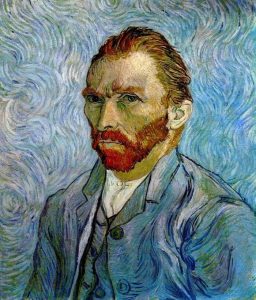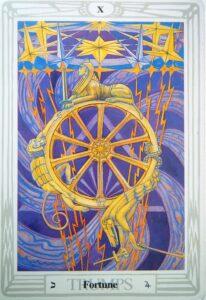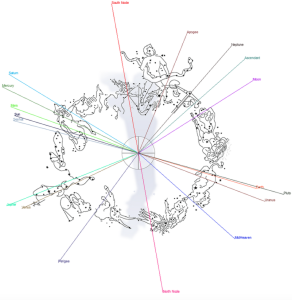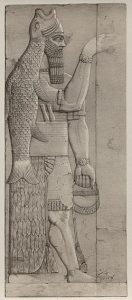Live Your Dream And Make A Living From It

Surfer Bethany Hamilton, wife of Laird Hamilton (see below) in a barrel of curling surf
Suppose you saw the that line, Live Your Dream and Make A Living From It on a website, in the title of a YouTube video, or anywhere else on social media from Instagram to X. What would you find if you pursued that proposition? What would you expect to be told about how to live your dream and be making a living at it?
Spiritual gurus (Eckhart Tolle), life coaches (Deepak Chopra), self-improvement programs (too many to name including prayer apps), get rich schemes (Tony Robbins), and new age success formulas (“The Secret”) abound on the internet today. Whatever these pitches may offer, and whatever cost or commitment they demand over time, they all overlook a fundamental premise of Celestics:
Whatever goals you choose in life,
you already have a calling to excel at what you make of your life.
The word calling is synonymous with vocation.
from early 15c., vocacioun, “spiritual calling, summons, urging” to a specific activity, from Old French vocacion “call, consecration, profession”, or directly from Latin vocationem , “being called” from vocatus , “to call,” related to vox, “voice” from PIE root *wekw- “to speak” or *reg-, “to reckon.”
In its original meaning, a vocation is not something you undertake at random, something you are told by others you must do, or do merely out of the need to earn a living. Rather, it is something that you are specifically called to undertake. But where does the call come from? The hackneyed word destiny is almost synonymous with calling. Your destiny calls you to do certain things in life, as if there is a pre-existing formula for how to best live out your time in this world. If so, who wrote that formula? What agency could be the author of your ideal life-plan?
Starry, Starry Night
When I formulated the beta-version of Celestics in the late 1990s, I realized that it could be an excellent tool for vocational guidance. I invented the “Starchild Cycle” to interpret the 16 entries in the manifold as vectors in an overall program of vocational guidance. This model adopts the Monomyth or Hero Cycle proposed by Joseph Campbell in The Hero with a Thousand Faces and elsewhere, but modifies it. Campbell assumed that upon returning from the quest, the hero/heroine receives a warm welcome from the tribe or community. The people recognise the prowess of the homecoming adventurer who has undergone exceptional tests for their benefit. They celebrate the larger-than-life accomplishment of the protagonist in the Hero Cycle and reward (usually) him (sometimes her) with the status of advisor and leader of the tribe.
I objected to Campbell’s view of the reception given to the returning hero. It was not true to my own quest and not true for others I investigated, except for some rare cases. In the past that outcome was perhaps more common, but in the global, mind-controlled, media-driven society of today, far from it. It is truly an heroic deed to claim your destiny and achieve an enduring purpose in this life, happily returning more than you receive. Nice work it you can get it. But in this unfair, insane, twisted and tormented world, it takes an act of heroic resignation to accept that you can give your best to the world and get nothing in return for it.

Last self-portrait of Van Gogh who died in 1890
Take van Gogh, for example. Or any of the dozens of other so-called “Romantic geniuses” who were unappreciated, scorned, or even hated in their lifetimes. By now the tragedy of the Romantic genius is a stale cliché of yesteryear. It is not by chance that van Gogh figures prominently on this platform along with Don McLean who wrote a song for him. He exemplifies what many gifted people face in our time.
Now I think I know
What you tried to say to me
And how you suffered for your sanity
And how you tried to set them free
They would not listen, they’re not listening still
Perhaps they never will
– From “Vincent” by Don McLean
Van Gogh traded his drawings and paintings for a sandwich and shelter for night. Today they are sold for millions. He risked ridicule, starvation, and madness to persist with his calling. Would you do the same? Are you up for that challenge? If so, perhaps Celestics can show you how to face it.
Proof of Concept
Have you noticed that what gets the most attention rarely deserves it? That phonies, scammers, and grifters like self-described “influencers” command fame and fortune — or at least they pretend to — while authenticity and genuine talent go overlooked and rejected? Have you observed that the system is rigged against the best in favor of the worst? There are so many factors working against the will to purpose (Earth) that I would have to write pages to describe them. But I suspect that you already know what they are. You see them every day in the ordinary course of life.
A film about van Gogh was titled Lust for Life. Semantic equivalence for Lust :: Sun, the lustrous star, source of vitality and moral stamina. Van Gogh’s passion for living :: Sun matched the contribution he sought to bring to the world. His Earth at the Grail Cup held by the Virgin is the legendary source of supernatural radiance. In the work of van Gogh, that radiance materialized in the dense medium of oil on canvas. In his case, both motives of Sun and Earth were so strong that nothing else mattered.
Are you capable of that kind of dedication? Would you risk all to be all that you can be, no matter the rejection or obstruction? What else really matters? Have you got something better to do? (Take it easy, I’m only teasing you.)

The most common and obvious impediment to following your calling is, of course, the need to survive, to earn a living. In some rare cases, an individual may find a means of livelihood that matches their vocation and fulfils the true calling of destiny. (We will look at that possibility below.) Due to the conditions of our time in the first quarter of the 21st century, such cases are rare and growing rarer. You might have to survive by foregoing or even sacrificing the will to thrive. You might be shackled to a job you hate so that you can afford to pay for food, clothing, shelter, simple pleasures, and freedom of mobility. No one escapes this dilemma except those born into situations of wealth and social power, but the evidence shows they are often lost and miserable people. Social pretences and privileges cannot conceal the falsity of their intentions and the vacuity of their goals. The rich and super-rich have no advantage in destiny, no matter the game of appearances. Sure, they have the resources to do whatever they want without the need to earn a living, but that does not give them an edge on their inner calling. More often, those who come from low class origins or even poverty (like van Gogh) have better odds to succeed in their calling.
If you are getting the drift of how Celestics works by now, you may wonder if it can show you how to beat the game in a system rigged against you. Can Celestics show you how to live your dream and make a living from it? That’s a good question that deserves a clear and simple answer.
Vectors of Purpose
At the pragmatic and common-sense level, Celestics is a tool for vocational guidance. You use it to define and evaluate your goals and aspirations. The objective of this practice is that simple. Among the top keywords in this method is endowment. To be endowed means to be gifted in some way, to be the recipient of certain talents and capacities. You can be endowed with beauty, intelligence, courage, musical or mathematical talent, humor, visionary imagination, etc. In material terms, you could be the beneficiary of a family fortune, endowed with wealth accumulated before you; but material wealth is only one kind of richness. Celestics invites you to consider that you are the beneficiary of wealth, as if it comes to you from an anonymous donor. Yet you may not even know that you have such an inheritance. That is, until someone informs you about it.
The manifold is a 16-point register of your endowment. It covers the full-spectrum range of your inner gifts and talents. But like a prescription for an exercise or diet plan, a self-help program, or the itinerary for a journey written on a piece of paper, it means nothing unless you follow it and take the steps to make it work. The proof of concept in your practice with Celestics is mastery of your life-narrative. Does that achievement automatically lead to success, fame, and fortune? Can I prove to you that you can achieve your endowment and make a living from it by using the method of forensic astronomy? No, absolutely not. But you can prove it to yourself.
Consider if you might fall into one of these three categories:
A. You are already fulfilling you dreams in life in a way that provides a livelihood.
B. You are searching for a way to make a living from your innate gifts, but unsure of how to proceed.
C. You lack a clear, confident view of your innate talents and how to apply them to earn a living.
These are three different vectors of purpose and each of us situates existentially somewhere on one of them. Pay attention to the vector that fits you. It will affect your orientation to the practice of Celestics. In case A, it can focus, confirm, and intensify what you are already doing. In case B, it can guide you to a better, more effective and comprehensive approach to your goals in life, confirming what you already know and showing how to correct what might not be right or effective in that approach. In case C, it can put you on a path of self-discovery toward a way of life where you can thrive, centered on the self-directing trajectory of purpose.
Natural Alignment
With those three cases in mind, I invite you to look at a question that I myself have reflected on many times: It is possible for someone to achieve the formula of optimal self-expression encoded in the manifold without knowing anything whatsoever about Celestics? The answer is, yes. In rare cases that can happen. But hold on a moment. That answer begs another question. In such a rare case, would the descriptive data in the manifold conform to what the individual achieved in the complete absence of the guidance that Celestics could have provided? If that conformity — the genomic match between asset > engram and proven achievement — could be shown, it would be convincing proof of concept for Celestics. Do I have such a case? Yes, I have discovered a few in the course of biographic research. Here is one.
Riding Giants is a well-documented history of surfing that highlights the remarkable life of Laird Hamilton. From an early age, Hamilton clearly knew his calling. He saw it without anyone advising him about it. It called him to go to the ocean and surf, and he followed it with single-minded determination, unfailing exuberance, and astonishing courage. It could be said that the ocean itself called to him. Like a mysterious woman of the sea, a mermaid or alluring siren. He himself said something like that. No one told him to listen for that call, and no one had to urge him to respond to it. He did not need a Celestician to read his manifold and inform him about it.
But what if he did have that opportunity to learn about his calling, say, at the age of ten? Would the Celestician have discovered in his manifold the match to what he later accomplished?

Rimsite of Laird Hamilton, widely considered to be the premier world-class surfer
Again, in Celestics what you see is what you get. The trick is, to get what you are seeing! The Rimsite immediately shows a striking distribution of manifold entries in two constellations, the Manitu and the Whales. The Celestician advising the young Hamilton with no clue to his calling would have translated the asset > engram entries in this way. Jupiter :: enthusiasm, social message, and Uranus :: originality, generational impact, are close together in the Eastern Whale that leaps upward from the ecliptic. That image already suggests a strong attraction to the ocean. It almost suggests the stunning figure of an upright surfer riding a massive, whale-size wave. Eastern Whale :: Sacred Origins, Antiquity, the legacy of the past. Riding Giants shows how Polynesians originally practiced surfing as a test of balance, prowess, and rapport with the overwhelming forces of the mother sea. For them it was an indigenous quest. Eastern Whale :: mystical immersion in nature, characterized by William James in The Varieties of Religious Experience (1902) as the “oceanic feeling.” Hamilton’s love of the sea and surf was a mystical calling. His relationship to the immense, life-threatening waves of the ocean was a transaction with sacred, superhuman power. He himself says so in the documentary. This is what a Celestician would have told the ten-year-old boy if he were not already aligned to his calling as Hamilton was.

Now scan to the right, westward along the ecliptic, and look at how the Western Whale :: Modernity, the Future, the trajectory toward the next age of enlightenment, swims into the currents streaming from the urn held by the Manitu. The constellation of the Watercarrier (Latin name Aquarius) invokes the figure of the Sumerian Enki, lord of the “sweet-water paradise”, the fresh water of rivers, lakes and underground aquifers. But it also resonates to the figure of Oannes, the Sumerian fish-man who emerges from the sea, from salty water. Apkallu is the Sumerian title for a group of initiates who brought civilization to the Fertile Crescent between the Tigris and Euphrates. (Bas-relief of an Apkallu figure from the temple of Ninurta at Nimrud.)
The mythic connotations and tropes of the zodiacal engrams are polysemous (pronounced poll-IS-em-US), “invested with a variety of meanings or signs.” All of them are potential clues for composing your life-narrative, but some are more pertinent than others. Some jump out at you, others are more elusive. You scan the inventory and select the clues that fit you. Studies of myth and legend supplemented by biographical evidence show that the Manitu designates a universal theme of human experience :: the vision quest or rite of passage. In native American lore, the Manitu :: the spirit of the wilderness or wild nature, on land or sea. In the oceanic cultures of Polynesia, Manitu :: the power of mana. A quick search bring up this definition:
In Polynesian culture, mana is a fundamental concept representing a spiritual, supernatural, or divine power that is believed to be inherent in individuals, objects, places, and even events. It’s not just a belief, but a living force that connects all things. Mana can be seen as a source of power, influence, authority, and efficacy. In Melanesian and Polynesian cultures, mana is a supernatural force that permeates the universe. Anyone or anything can have mana. They believed it to be a cultivation or possession of energy and power, rather than being a source of power. It is an intentional force.
In the landbound cultures of Native America, this force is called Wakanda or Wakan Tanka. Among the equally land-bound cultures of Australia, Aboriginal lore identifies this all-pervasive power as the Rainbow Serpent, associated with rainbows, rain, rivers, and deep waterholes — as close as the get to water. Uranus :: generational impact demonstrated by an innovative or trailblazing action. Riding Giants shows how Hamilton’s adventure in surfing became a rite of passage for an entire generation. Drawing upon an indigenous practice :: Eastern Whale, he advanced surfing into a modern, world-class art :: Western Whale. He surfed the current streaming from the urn of the Manitu. This is an expression of mythopoetic truth, of course. It is also a literal rendering of biographic evidence from the life of Laird Hamilton.
I could continue to decode this manifold at length. Hamilton has Saturn, Mercury, Mars, Sun and Seshat in the Manitu. Every detail of the zodiacal graphic tells a story that matches biographic evidence. Notice how Saturn :: self-trust, moral resolution, social mission aligns to the head of the Manitu. The vision quest is always a solitary adventure, but what the young initiate sees in the encounter with wild nature can become wisdom for the tribe. Hamilton showed the daring :: Mars to surf the most treacherous waves on his own hundreds of times. What he saw and learned then became the legacy of his generation. Through his Earth :: contribution, the beauty of the myth you love > loins of the Lion, he passed on his passion to his wife and family, and not only his biological family. Many others became expert surfers from the example of his skill and courage. Lion :: the prowess of those who are noble, who embody excellence.
The biographic data base for Celestics contains more than a thousand examples and it is continually expanding. All of them are lived before there was a Celestician to advise them on their calling. Yet many show a high ratio of genomic matches. How about Joshua Slocum, the first man to sail alone around the world? Would you expect to find similar mythic themes in his manifold? Or in the manifold of American author Herman Melville who wrote the most famous whaling story of all time, Moby Dick? BIOGRAPHY [to be published] covers examples of such cases, called exemplars. Learning about their life-narratives can teach you many thing about your own.
The Price of Sanity
You have probably heard the saying, “Freedom ain’t free.” This is an obvious truth of common sense. It can likewise be said, “Sanity comes with a price.” Often that price comes in the form of suffering.
Now I think I know
What you tried to say to me
And how you suffered for your sanity
And how you tried to set them free
They would not listen, they’re not listening still
Perhaps they never will
– From the song “Vincent” by Don McLean
That stanza from “Vincent” points to a universal theme of the human condition: suffering. Combine that with the quest for purpose and you have a question: Do I need to suffer to achieve my purpose? A trenchant question there. But one might rather ask, Are you willing to suffer to achieve your purpose? Issues around suffering are extremely difficult to work out due to the polarity of suffering and happiness. There is a loose general assumption that happiness means a life without suffering. But this is a false dichotomy. Flamenco guitarist Paco de Lucia is a prominent exemplar in Celestics. In an interview about his life and art, he was asked if he had to suffer to be a master of extraordinary talent, and if so, how that impacted his ordinary happiness. He replied, “You can’t be happy unless you suffer.”
The victim syndrome (denoted by Neptune in Celestics) is a popular refuge for people who feel that they are getting a raw deal in life and believe they are entitled to better treatment. Entitlement to special treatment comes with this syndrome, often based on false or imagined grounds. In some case, actual abuse comes into the equation, so there are genuine victims of harm inflicted by others. Social media abounds with both types of victims and so there is a lot of outrage about what people suffer from — emphasis on from. But what you suffer for is another issue altogether. If you do not suffer for your sanity in this insane world, there is a good chance that you are not actually sane at all.
Celestics does not offer an exemption from suffering. It does not guarantee to give you the answer to success in life. In brutal reality, there is no guarantee that anyone will even survive in the world today, much less succeed. But Celestics improves the odds that whatever you undertake, whatever you choose willingly to suffer for, will ultimately fulfil you. It can do this due to how it aligns you to your calling. It can show you how to trust yourself against all odds.
Self-trust is the first secret of success.
Ralph Waldo Emerson, Essays
Emerson is an exemplar. His Saturn :: self-trust located in the Lion, the mythic image of heroic strength. Emerson’s message of self-trust is consistent with the asset > engram encoded in his manifold. The Lion was his test-case for proving he could master that asset. For Hamilton, the Manitu was scripting template for the test case. What is your test-case for proving self-trust? What are you willing to suffer to accomplish your dreams in life? Some degree of suffering is unavoidable in life, and can indeed co-exist with happiness. The secret is, to suffer for a chosen purpose :: Earth, and trust yourself :: Saturn to uphold it, no matter what comes back to you from an insane world.
If you can turn your dream into a successful venture of whatever kind, earning a livelihood, fine. But even if you can’t, self-reliance on your innate gifts is the best assurance of happiness. You can be happy living your passion regardless of the reward it brings. Doing what you truly love is a reward in itself. What you truly love is the only thing that endures and survives you. It is the solution to the meaning of both suffering and happiness. Everything else is circumstantial.
